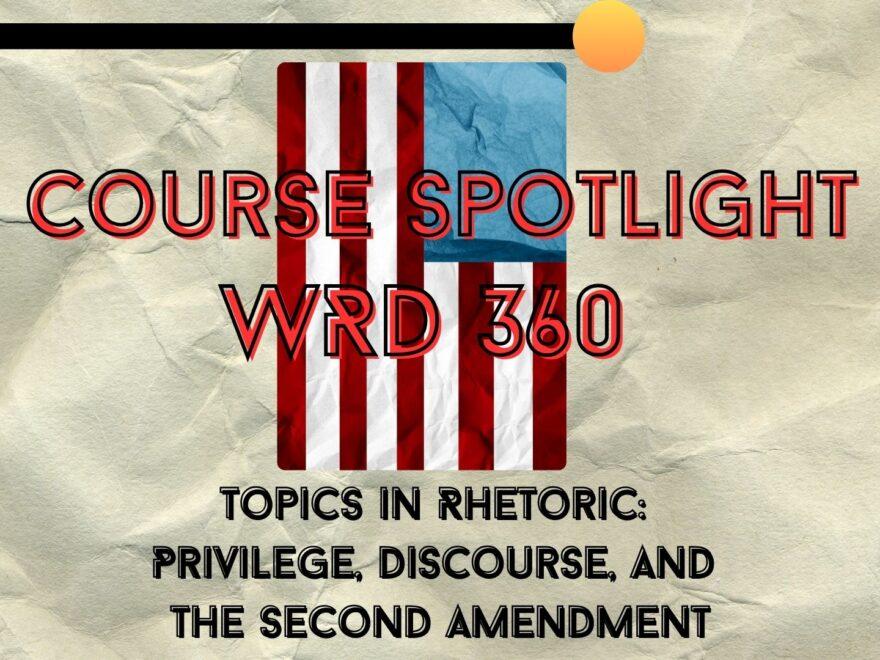In Spring Quarter 2025, Dr. Michael Gallaway will be teaching WRD 360 Topics in Rhetoric: Privilege, Discourse, and the Second Amendment. This class enters debates on who is allowed to do what, particularly when it comes to enacting citizenship through the right to bear arms. Read on to learn more about what this class entails and hear why you should enroll this Spring Quarter!
Course Goals and Learning Objectives
This course emerged as an extension of the Lived Civics Initiative that DePaul started a few years ago, wherein the University was awarded a grant to examine the ways that people engage with society. The course asks the question of what rules we follow and how those everyday practices uphold or rebel against the social contract.
Dr. Gallaway plans on engaging in discourse around the second amendment beyond just the debates students see in social media following tragic incidents. By looking at how the rhetoric of the second amendment manifests in speech and physical enactments, students will learn to answer questions like: How do people engage in the physical environment with a gun? How does the gun dictate who can and cannot engage civically? How does this end up enforcing dominant ideologies? For instance, why would conservative darling Ronald Reagan, a National Rifle Association (NRA) poster child, enforce stricter gun control during his time as the Governor of California in response to the presence of the Black Panthers? Why is Philando Castile killed for legally owning a gun, while Kyle Rittenhouse is found innocent after killing others with his?
The goal of the course is not to sway people to any one stance on the second amendment, but rather to engage with questions of who gets to wield power.
Dr. Gallaway’s Interest in Teaching this Subject
Having come from Texas, where guns are a large part of the culture, Dr. Gallaway saw a disconnect in how he was being taught guns are for hunting and protection, and the way guns were actually being used. He shared that open carry laws, like where someone can bring an AR-15 into a Panera Bread, manifested gun ownership as a display of intimidation. He wondered how guns are used to enforce race and settler colonial ideas, empowering certain people to go on and be minutemen on the border of Texas, or comparatively, become mass shooters.
Dr. Gallaway was so interested in these ideas that he wrote a chapter of his dissertation on it. Looking at the intersection between rhetorical new materialism and whiteness, he investigated how the physical environment empowers people. He found that this Topics in Rhetoric class was the perfect opportunity to teach how the second amendment enforces racialized hierarchies.
Course Structure
In the first portion of the course, the class will look at social contract theory and lived civics. They will ask how people engage in society, what unsaid rules people follow, and what our goals are as a society. While the class first engages in social contract theory and theorists like Locke and Rousseau in a vacuum, they will go on to complicate those ideas by learning about racial and gender contracts.
After that, the class digs into legal theory, like debates and scholarship, insofar as they were influential in cementing the second amendment. Finally, the class will learn contemporary rhetorical theory which looks at the applications of the second amendment and analyzes public discourse.
Major Projects and Assignments
Dr. Gallaway’s pedagogical practice is centered on choice. He provides opportunities for students to write about what they want to write about, but in a way that is scaffolded for support. Students will start by writing a proposal, performing research, and then synthesizing their findings. These assignments feed into the final research paper or multimodal project, as Dr. Gallaway allows students to make a podcast, short film, series of social media posts, or other kinds of creative projects if they want to.
Final Thoughts and Takeaways
When asked what final thought he would like to leave readers with, Dr. Gallaway shared, “although we’re talking about a very heady and serious concept, I try my best to make the class fun” by engaging students with a variety of media like movies and videos along with the literature.
If you’re interested in WRD 360 Topics in Rhetoric: Privilege, Discourse, and the Second Amendment, don’t miss your opportunity to enroll this Spring Quarter 2025! To learn more about other course offerings, visit Course Spotlights here on the WRD Blog.
